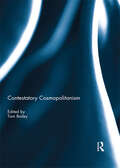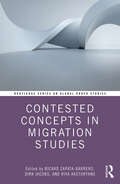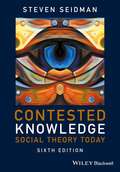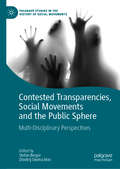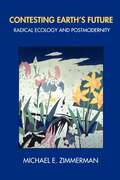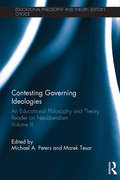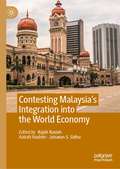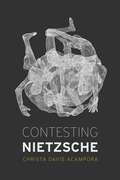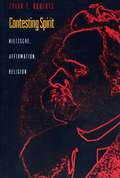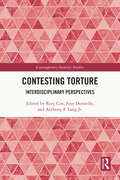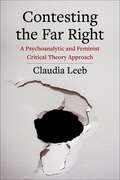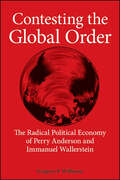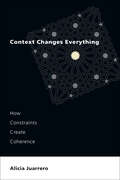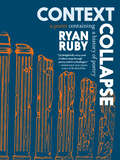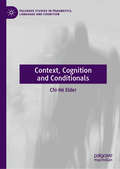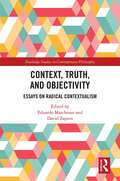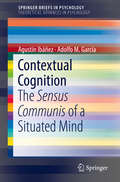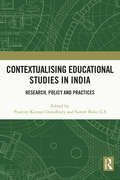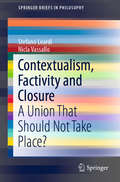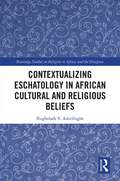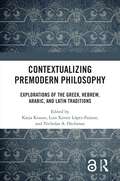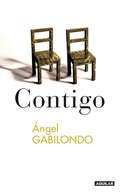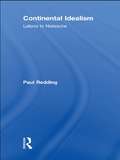- Table View
- List View
Contestatory Cosmopolitanism
by Tom BaileyContemporary global politics poses urgent challenges – from humanitarian, migratory and environmental problems to economic, religious and military conflicts – that strain not only existing political systems and resources, but also the frameworks and concepts of political thinking. The standard cosmopolitan response is to invoke a sense of global community, governed by such principles as human rights or humanitarianism, free or fair trade, global equality, multiculturalism, or extra-national democracy. Yet, the contours, grounds and implications of such a global community remain notoriously controversial, and it risks abstracting precisely from the particular and conflictual character of the challenges which global politics poses. The contributions to this collection undertake to develop a more fruitful cosmopolitan response to global political challenges, one that roots cosmopolitanism in the particularity and conflict of global politics itself. They argue that this ‘contestatory’ cosmopolitanism must be dialectical, agonistic and democratic: that is, its concepts and principles must be developed immanently and critically out of prevailing normative resources; they must reflect and acknowledge their antagonistic roots; and they must be the result of participatory and self-determining publics. In elaborating this alternative, the contributions also return to neglected cosmopolitan theorists like Hegel, Adorno, Arendt, Camus, Derrida, and Mouffe, and reconsider mainstream figures such as Kant and Habermas. This collection was originally published as a special edition of Critical Horizons.
Contested Concepts in Migration Studies (Routledge Series on Global Order Studies)
by Ricard Zapata-Barrero Riva Kastoryano Dirk JacobsThis volume demonstrates that migration- and diversity-related concepts are always contested, and provides a reflexive critical awareness and better comprehension of the complex questions driving migration studies. The main purpose of this volume is to enhance conceptual thinking on migration studies. Examining interaction between concepts in the public domain, the academic disciplines, and the policy field, this book helps to avoid simplification or even trivialization of complex issues. Recent political events question established ways of looking at issues of migration and diversity and require a clarification or reinvention of political concepts to match the changing world. Applying five basic dimensions, each expert chapter contribution reflects on the role concepts play and demonstrates that concepts are ideology dependent, policy/politics dependent, context dependent, discipline dependent, and language dependent, and are influenced by how research is done, how policies are formulated, and how political debates extend and distort them. This book will be essential reading for students, scholars, and practitioners in migration studies/politics, migrant integration, citizenship studies, racism studies, and more broadly of key interest to sociology, political science, and political theory.
Contested Knowledge: Social Theory Today
by Steven SeidmanIn the sixth edition of Contested Knowledge, social theorist Steven Seidman presents the latest topics in social theory and addresses the current shift of 'universalist theorists' to networks of clustered debates. Responds to current issues, debates, and new social movements Reviews sociological theory from a contemporary perspective Reveals how the universal theorist and the era of rival schools has been replaced by networks of clustered debates that are relatively 'autonomous' and interdisciplinary Features updates and in-depth discussions of the newest clustered debates in social theory—intimacy, postcolonial nationalism, and the concept of 'the other' Challenges social scientists to renew their commitment to the important moral and political role social knowledge plays in public life
Contested Transparencies, Social Movements and the Public Sphere: Multi-Disciplinary Perspectives (Palgrave Studies in the History of Social Movements)
by Stefan Berger Dimitrij OwetschkinThis edited collection examines the multi-faceted phenomenon of transparency, especially in its relation to social movements, from a range of multi-disciplinary viewpoints. Over the past few decades, transparency has become an omnipresent catch phrase in public and scientific debates. The volume tracks developments of ideas and practices of transparency from the eighteenth century to the current day, as well as their semantic, cultural and social preconditions. It connects analyses of the ideological implications of transparency concepts and transparency claims with their impact on the public sphere in general and on social movements in particular. In doing so, the book contributes to a better understanding of social conflicts and power relations in modern societies. The chapters are organized into four parts, covering the concept and ideology of transparency, historical and recent developments of the public sphere and media, the role of the state as an agent of surveillance, and conflicts over transparency and participation connected to social movements.
Contesting Earth's Future: Radical Ecology and Postmodernity
by Michael E. ZimmermanRadical ecology typically brings to mind media images of ecological activists standing before loggers' saws, staging anti-nuclear marches, and confronting polluters on the high seas. Yet for more than twenty years, the activities of organizations such as the Greens and Earth First! have been influenced by a diverse, less-publicized group of radical ecological philosophers. It is their work—the philosophical underpinnings of the radical ecological movement—that is the subject of Contesting Earth's Future.The book offers a much-needed, balanced appraisal of radical ecology's principles, goals, and limitations. Michael Zimmerman critically examines the movement's three major branches—deep ecology, social ecology, and ecofeminism. He also situates radical ecology within the complex cultural and political terrain of the late twentieth century, showing its relation to Martin Heidegger's anti-technological thought, 1960s counterculturalism, and contemporary theories of poststructuralism and postmodernity.An early and influential ecological thinker, Zimmerman is uniquely qualified to provide a broad overview of radical environmentalism and delineate its various schools of thought. He clearly describes their defining arguments and internecine disputes, among them the charge that deep ecology is an anti-modern, proto-fascist ideology. Reflecting both the movement's promise and its dangers, this book is essential reading for all those concerned with the worldwide ecological crisis.
Contesting Education and Identity in Hong Kong (Citizenship, Character and Values Education)
by Liz JacksonThis text examines the intersection of youth civic engagement, identity, and protest in Hong Kong, through the lens of education. It explores how education and identity have been protested in Hong Kong, historically and today, and the mark that such contestations have left on education. Many people, particularly outside Hong Kong, were astonished by youth participation in the Umbrella Movement of 2013–2014, and the anti-extradition law protests in 2019. These protests have caused people to consider what has changed in Hong Kong over time, and what education has to do with youth civic engagement and political expression. This book provides an academic, theoretically oriented perspective on the intersection of youth identity and education in Hong Kong. Coming from an educational (and philosophical) orientation, Jackson focuses on areas where greater understanding, and greater potential agreement, might be developed, when it comes to education. This book will be of interest to educational policy makers, curriculum specialists, and educational scholars and students in liberal studies, social studies, civic education, comparative and international education, multicultural education, and youth studies.
Contesting Governing Ideologies: An Educational Philosophy and Theory Reader on Neoliberalism, Volume III (Educational Philosophy and Theory: Editor’s Choice)
by Michael A. Peters Marek TesarContesting Governing Ideologies is the third volume in the Educational Philosophy and Theory: Editor’s Choice series and represents a collection of texts that provide a cutting-edge analysis of the philosophy and theory of performances of neoliberal ideology in education. In past decades, philosophy of education has provided a critical commentary on problematic areas of neoliberal ideology. As such, this collection argues, philosophy of education can be considered as an intellectual struggle that runs through the contemporary ideological landscape and has roots that go back to the Enlightenment in its traditions. This book covers multiple philosophical and educational theoretical perspectives of what we know about the ideology of neoliberalism, and many of its practices and projects. Neoliberalism is difficult to define, but what is certain is that it has significantly matured as a political doctrine and set of policy practices. This collection covers questions of ideology, politics, and policy in relation to the subject and the institution alike. The chapters in this book provide rich and diverse reading, allowing readers to rethink established discourses and contest ideologies, providing a thorough and careful philosophical and theoretical analysis of the story of neoliberalism over the past decades. Contesting Governing Ideologies will be key reading for academics, researchers and postgraduate students in the fields of philosophy of education, philosophy, education, educational theory, post-structural theory, the policy and politics of education, and the pedagogy of education.
Contesting Malaysia’s Integration into the World Economy
by Rajah Rasiah Azirah Hashim Jatswan S. SidhuThis book brings together a set of incisive essays that interrogate Malaysian history and social relations which began during pre-colonial times, and extended to colonial and post-colonial Malaysia. It addresses economic misinterpretations of the role of markets in the way colonial industrialisation evolved, the nature of exploitation of workers, and the participation of local actors in shaping a wide range of socioeconomic and political processes. In doing so, it takes the lead from the innovative historian, Shaharil Talib Robert who argued that the recrafting of history should go beyond the use of conventional methodologies and analytic techniques. It is in that tradition that the chapters offer a semblance of causality, contingency, contradictions, and connections. With that, the analysis in each chapter utilises approaches appropriate for the topics chosen, which include history, anthropology, sociology, economics, politics, and international relations. The collection of chapters also offer novel interpretations to contest and fill gaps that have not been addressed in past works. The book is essential reading for history students, and those interested in Malaysian history in particular.
Contesting Nietzsche
by Christa Davis AcamporaA brilliant exploration of a significant and understudied aspect of Nietzsche’s philosophy. In this groundbreaking work, Christa Davis Acampora offers a profound rethinking of Friedrich Nietzsche’s crucial notion of the agon. Analyzing an impressive array of primary and secondary sources and synthesizing decades of Nietzsche scholarship, she shows how the agon, or contest, organized core areas of Nietzsche’s philosophy, providing a new appreciation of the subtleties of his notorious views about power. By focusing so intensely on this particular guiding interest, she offers an exciting, original vantage from which to view this iconic thinker: Contesting Nietzsche. Though existence—viewed through the lens of Nietzsche’s agon—is fraught with struggle, Acampora illuminates what Nietzsche recognized as the agon’s generative benefits. It imbues the human experience with significance, meaning, and value. Analyzing Nietzsche’s elaborations of agonism—his remarks on types of contests, qualities of contestants, and the conditions in which either may thrive or deteriorate—she demonstrates how much the agon shaped his philosophical projects and critical assessments of others. The agon led him from one set of concerns to the next, from aesthetics to metaphysics to ethics to psychology, via Homer, Socrates, Saint Paul, and Wagner. In showing how one obsession catalyzed so many diverse interests, Contesting Nietzsche sheds fundamentally new light on some of this philosopher’s most difficult and paradoxical ideas.
Contesting Spirit: Nietzsche, Affirmation, Religion
by Tyler T. RobertsChallenging the dominant scholarly consensus that Nietzsche is simply an enemy of religion, Tyler Roberts examines the place of religion in Nietzsche's thought and Nietzsche's thought as a site of religion. Roberts argues that Nietzsche's conceptualization and cultivation of an affirmative self require that we interrogate the ambiguities that mark his criticisms of asceticism and mysticism. What emerges is a vision of Nietzsche's philosophy as the enactment of a spiritual quest informed by transfigured versions of religious tropes and practices.Nietzsche criticizes the ascetic hatred of the body and this-worldly life, yet engages in rigorous practices of self-denial--he sees philosophy as such a practice--and affirms the need of imposing suffering on oneself in order to enhance the spirit. He dismisses the "intoxication" of mysticism, yet links mysticism, power, and creativity, and describes his own self-transcending experiences. The tensions in his relation to religion are closely related to that between negation and affirmation in his thinking in general. In Roberts's view, Nietzsche's transfigurations of religion offer resources for a postmodern religious imagination. Though as a "master of suspicion," Nietzsche, with Freud and Marx, is an integral part of modern antireligion, he has the power to take us beyond the flat, modern distinction between the secular and the religious--a distinction that, at the end of modernity, begs to be reexamined.
Contesting Torture: Interdisciplinary Perspectives (Contemporary Security Studies)
by Anthony F. Lang Jr. Faye Donnelly Rory CoxThis edited volume seeks to contest prevailing assumptions about torture and to consider why, despite its illegality, torture continues to be widely employed and misrepresented. The resurgence of torture and public justifications of it led to the central questions that this inter-disciplinary volume seeks to address: How is it possible for torture to be practiced when it is legally prohibited? What kinds of moves do agents make that render torture palatable? Why do so many ignore the evidence that torture is ineffective as an intelligence-gathering technique? Who are the victims of torture? The various contributors in the book look to history, the practices of interrogators, artistic representations, documentary films, rendition policies, political campaigns, diplomatic discourses, international legal rules, refugee practices, and cultural representations of death and the body to illuminate how torture becomes permissible. Building from the personal to the communal, and from the practical to the conceptual, the volume reflects the multivalence of torture itself. This framework enables readers at all levels better appreciate how and why torture is open to so many interpretations and applications. This book will be of much interest to students of International Relations, Security Studies, Terrorism Studies, Ethics, and International Legal Studies.
Contesting the Far Right: A Psychoanalytic and Feminist Critical Theory Approach (New Directions in Critical Theory #88)
by Claudia LeebWhy have so many people responded to the insecurity, exploitation, alienation, and isolation of precarity capitalism by supporting the far right? In this timely book, Claudia Leeb argues that psychoanalytic and feminist critical theory illuminates how economic and psychological factors interact to produce this extreme political shift.Contesting the Far Right examines right-wing recruitment tactics in the United States and Austria, where people discontented with the status quo have turned to far-right parties and movements that further cement capitalism’s adverse effects. Leeb contends that Freudian psychoanalytic theory and early Frankfurt School Critical Theory provide analytical tools to explain this apparent contradiction in psychological terms. Living under precarity capitalism generates feelings of failure and anxiety, which people experience as non-wholeness, because it has become difficult if not impossible to live up to the fetish of economic, interpersonal, and bodily success, and the far right preys on such feelings. Its psychologically oriented propaganda tactics produce the illusion of wholeness and a positive sense of self while leaving the socioeconomic conditions that cause people’s suffering intact. At the same time, they remove the inhibitions that keep people’s repressed aggression and racist and sexist attitudes in check. To demonstrate the workings of this process, Leeb compares cases including Trump and the alt-right in the United States and the Freedom Party and the identitarian movement in Austria. At once theoretically rich and politically engaged, this book also offers ways to resist the far right and counter the psychological appeal of its propaganda techniques.
Contesting the Global Order: The Radical Political Economy of Perry Anderson and Immanuel Wallerstein (SUNY series in New Political Science)
by Gregory P. Williams2021 CHOICE Outstanding Academic TitleContesting the Global Order explores what it means to be a radical intellectual as political hopes fade. Gregory P. Williams chronicles the evolution of intellectual visionaries Perry Anderson and Immanuel Wallerstein, who despite altered circumstances for radical change, continued to advance creative interpretations of the social world. Wallerstein and Anderson, whose hopes were invested in a more egalitarian future, believed their writings would contribute to socialism, which they anticipated would be a postcapitalist future of relative social, economic, and political equality. However, by the 1980s dreams of socialism had faded and they had to face the reality that socialism was neither close nor inevitable. Their sensitivity to current events, Williams argues, takes on new significance in this century, when many scholars are grappling with the issue of change in a world of declining state power.
Context Changes Everything: How Constraints Create Coherence
by Alicia JuarreroFrom the influential author of Dynamics in Action, how the concepts of constraints provide a way to rethink relationships, opening the way to intentional, meaningful causation.Grounding her work in the problem of causation, Alicia Juarrero challenges previously held beliefs that only forceful impacts are causes. Constraints, she claims, bring about effects as well, and they enable the emergence of coherence. In Context Changes Everything, Juarrero shows that coherence is induced by enabling constraints, not forceful causes, and that the resulting coherence is then maintained by constitutive constraints. Constitutive constraints, in turn, become governing constraints that regulate and modulate the way coherent entities behave. Using the tools of complexity science, she offers a rigorously scientific understanding of identity, hierarchy, and top-down causation, and in so doing, presents a new way of thinking about the natural world. Juarrero argues that personal identity, which has been thought to be conferred through internal traits (essential natures), is grounded in dynamic interdependencies that keep coherent structures whole. This challenges our ideas of identity, as well as the notion that stability means inflexible rigidity. On the contrary, stable entities are brittle and cannot persist. Complexity science, says Juarrero, can shape how we meet the world, how what emerges from our interactions finds coherence, and how humans can shape identities that are robust and resilient. This framework has significant implications for sociology, economics, political theory, business, and knowledge management, as well as psychology, religion, and theology. It points to a more expansive and synthetic philosophy about who we are and about the coherence of living and nonliving things alike.
Context Collapse: A Poem Containing a History of Poetry
by Ryan RubyLiterary critic Ryan Ruby uncovers the secret history of poetry in a mock-academic verse essay filled with wit and wisdom.One of Publishers Weekly's Best Books of 2024Prophet. Entertainer. Courtier. Criminal. Revolutionary. Critic. Scholar. Nobody. Epic in sweep, Context Collapse is the secret history of the poet—from Bronze Age Greece and Renaissance Italy to the cafés of Grub Street and the Latin Quarter, from the creative writing departments of the American Midwest to the boardrooms of Silicon Valley. Cheekily introducing academic discourse, media studies, cybersemiotics, literary sociology, and heterodox economics into his blank verse study of poetry, Ruby traces the always delicate dance between poets, their publishers, and their audiences, and shows how, time and time again, the social, technological, and aesthetic experiments that appear in poetic language have prefigured radical changes to the ways of life of millions of people. It is precisely to poets to whom we ought to turn to catch a glimpse, as Shelley once put it, of the &“gigantic shadows futurity casts on the present.&”
Context, Cognition and Conditionals (Palgrave Studies in Pragmatics, Language and Cognition)
by Chi-Hé ElderThis book proposes a semantic theory of conditionals that can account for (i) the variability in usages that conditional sentences can be put; and (ii) both conditional sentences of the form ‘if p, q’ and those conditional thoughts that are expressed without using ‘if’. It presents theoretical arguments as well as empirical evidence from English and other languages in support of the thesis that an adequate study of conditionals has to go beyond an analysis of specific sentence forms or lexical items. The resulting perspective on conditionals is one in which conditionality is located at a higher level than that of the sentence; namely, at the level of thought. The author argues that it is only through adopting such a perspective, and with it, a commitment to context-dependent semantics, that we can successfully represent conditional utterances as they are used and understood by ordinary language users. It will be of interest to students and scholars working on the semantics of conditionals in the fields of linguistics (especially semantics and pragmatics) and philosophy of language.
Context, Truth and Objectivity: Essays on Radical Contextualism (Routledge Studies in Contemporary Philosophy)
by Eduardo Marchesan David ZaperoThe claim according to which there is a categorial gap between meaning and saying – between what sentences mean and what we say by using them on particular occasions – has come to be widely regarded as being exclusively a claim in the philosophy of language. The present essay collection takes a different approach to these issues. It seeks to explore the ways in which that claim – as defended first by ordinary language philosophy and, more recently, by various contextualist projects – is grounded in considerations that transcend the philosophy of language. More specifically, the volume seeks to explore how that claim is inextricably linked to considerations about the nature of truth and representation. It is thus part of the objective of this volume to rethink the current way of framing the debates on these issues. By framing the debate in terms of an opposition between "ideal language theorists" and their semanticist heirs on the one hand and "communication theorists" and their contextualist heirs on the other, one brackets important controversies and risks obscuring the undoubtedly very real oppositions that exist between different currents of thought.
Contextual Cognition: The Sensus Communis of a Situated Mind (SpringerBriefs in Psychology)
by Agustín Ibáñez Adolfo M. GarcíaThis Brief introduces two empirically grounded models of situated mental phenomena: contextual social cognition (the collection of psychological processes underlying context-dependent social behavior) and action-language coupling (the integration of ongoing actions with movement-related verbal information). It combines behavioral, neuroscientific, and neuropsychiatric perspectives to forge a novel view of contextual influences on active, multi-domain processes. Chapters highlight the models' translational potential for the clinical field by focusing on diseases compromising social cognition (mainly illustrated by behavioral variant frontotemporal dementia) and motor skills (crucially, Parkinson’s disease). A final chapter sets forth metatheoretical considerations regarding intercognition, the constant binding of processes triggered by environmental and body-internal sources, which confers a sensus communis to our experience. In addition, the book includes two commentaries written by external peers pondering on advantages and limits of the proposal. Contextual Cognition will be of interest to students, teachers, and researchers from the fields of cognitive science, neurology, psychiatry, neuroscience, psychology, behavioral science, linguistics, and philosophy.
Contextualising Educational Studies in India: Research, Policy and Practices
by Pradeep Kumar Choudhury Suresh Babu G.SThis volume presents an interdisciplinary framework to map out contemporary educational studies in India. Based on conceptual tools, quantitative methods and ethnographic accounts drawn from extensive fieldwork, it addresses emerging discourses on educational policies, their operation in the everyday functioning of institutions and actual practices in teaching and learning. Individual chapters discuss the intersectionality in the current educational system of region, gender, class, caste and minorities. With comparative perspectives and case studies from across states, including under-studied rural and urban regions of India, the book explores a wide range of issues affecting the educational system, including socioeconomic and gender inequalities; the educational status of tribal settlements in the hinterlands and their respective urban areas; the marginalisation of minorities; challenges in accessing educational avenues and choices; and the model for imparting vocational education and training. It navigates complex sites of discrimination and exclusion in the institutional spaces of the educational system and assesses the consequences of market dynamics and ideological undercurrents. Presenting first-hand information from the field, it evaluates educational policies, practices and research; investigates challenges and failures; provides suggestions and fosters critical thinking for a knowledge society. The findings in this book will be of interest to researchers, scholars and teachers of education, economics, sociology, urban education and the politics of education, as well as of public policy, governance and development studies. It will also be useful to research institutions, policymakers, educationists, social scientists, education professionals, and governmental and non-governmental bodies working on education.
Contextualism, Factivity and Closure: A Union That Should Not Take Place? (SpringerBriefs in Philosophy)
by Nicla Vassallo Stefano LeardiThis book analyses an inconsistency within epistemic contextualism known as the factivity problem. It also provides key insights into epistemic contextualism, an important innovation in contemporary epistemology, enabling readers to gain a better understanding of the various solutions to the factivity problem. As the authors demonstrate, each explanation is based on a different interpretation of the problem. Divided into seven chapters, the book offers comprehensive coverage of this topic, which will be of major interest to philosophers engaged in epistemology and the philosophy of language. After an introductory chapter, Chapter 2 presents the most common understanding of epistemic contextualism and its semantic basis. It also clarifies the epistemological implications of the theory’s semantic assumptions. This chapter also explains the main argument of the factivity problem.The next four chapters discuss the respective solutions proposed by Wolfgang Freitag, Alexander Dinges, Anthony Brueckner and Christopher Buford, Michael Ashfield, Martin Montminy and Wes Skolits, and Peter Baumann. Stefano Leardi and Nicla Vassallo highlight the similarities and commonalities, identifying three main approaches to the factivity problem.Chapter 7 provides a brief overview of the solutions proposed to solve the factivity problem and presents an outline of the conclusions reached in the book.
Contextualizing Eschatology in African Cultural and Religious Beliefs (Routledge Studies on Religion in Africa and the Diaspora)
by Ibigbolade S. AderibigbeContextualizing Eschatology in African Cultural and Religious Beliefs addresses the African consciousness and nuances of eschatological beliefs as part and parcel of the holistic African Indigenous worldviews within the context of the people's traditional heritage. The concept of eschatology is usually explained from the perspective of "endtimes" in relation to either the human individual or the cosmos. Within these contexts, the primary interests, particularly with regard to human eschatology, have centred on the questions of death, afterlife, immortality, destiny, judgment, reward and punishment, and the final destination or eternal "home" of humans. This book explores the characteristic nature, the modes, the process as well as the dynamics associated with the various features culminating the functional expression of the "reality" of eschatological beliefs demonstrated in varied but fundamentally the same subject matter of practices among different African ethnic groups. It also discusses the influences of other religious traditions, particularly Christianity and Islam, on contemporary African eschatological thoughts and their attendant consequences. This book will be of interest to students and scholars of African studies, eschatology, religious studies, and the philosophy of religion.
Contextualizing Premodern Philosophy: Explorations of the Greek, Hebrew, Arabic, and Latin Traditions
by Luis Xavier López-Farjeat Katja Krause Nicholas A. OschmanThis volume brings together contributions from distinguished scholars in the history of philosophy, focusing on points of interaction between discrete historical contexts, religions, and cultures found within the premodern period. The contributions connect thinkers from antiquity through the Middle Ages and include philosophers from the three major monotheistic faiths—Judaism, Islam, and Christianity. By emphasizing premodern philosophy’s shared textual roots in antiquity, particularly the writings of Plato and Aristotle, the volume highlights points of cross-pollination between different schools, cultures, and moments in premodern thought. Approaching the complex history of the premodern world in an accessible way, the editors organize the volume so as to underscore the difficulties the premodern period poses for scholars, while accentuating the fascinating interplay between the Greek, Hebrew, Arabic, and Latin philosophical traditions. The contributors cover many topics ranging from the aims of Aristotle’s cosmos, the adoption of Aristotle’s Organon by al-Fārābī, and the origins of the Plotiniana Arabica to the role of Ibn Gabirol’s Fons vitae in the Latin West, the ways in which Islamic philosophy shaped thirteenth-century Latin conceptions of light, Roger Bacon’s adaptation of Avicenna for use in his moral philosophy, and beyond. The volume’s focus on "source-based contextualism" demonstrates an appreciation for the rich diversity of thought found in the premodern period, while revealing methodological challenges raised by the historical study of premodern philosophy. Contextualizing Premodern Philosophy: Explorations of the Greek, Hebrew, Arabic, and Latin Traditions is a stimulating resource for scholars and advanced students working in the history of premodern philosophy.
Contigo
by Ángel GabilondoÁngel Gabilondo recupera la palabra que nos falta, la que a menudo callamos, y nos anima a intensificar la pasión de buscar, de perseguir, de rememorar y de conformar una nueva posibilidad, una realidad diferente que nos acerque. «Contigo es menos difícil»Ángel Gabilondo No siempre encontramos las palabras adecuadas. En ocasiones éstas se desvanecen antes de llegar. Se produce entonces una sensación incómoda de incomunicación. Lamentamos no haber sido capaces de verbalizar lo que pensamos o sentimos. Todos necesitamos de alguien que nos hable, que nos abrace, que nos descubra. Convivir y compartir sin apenas decirnos nada acaba por impedir los sueños y los deseos que nos completan en compañía del otro. Contigo nos sitúa en el espacio donde se produce la ruptura entre lo que nos sucede y lo que decimos, en el entorno de aquello que nuestros labios se reservan, en el territorio de los encuentros que son también desencuentros. En él nos sorprenden los sueños y los deseos, las dudas, la incertidumbre, la añoranza y allí nos damos cuenta de que «contigo», con alguien, es todo menos difícil.
Continental Drift
by Benjamin Grob-FitzgibbonIn the aftermath of the Second World War, Churchill sought to lead Europe into an integrated union, but just over seventy years later, Britain is poised to vote on leaving the EU. Benjamin Grob-Fitzgibbon here recounts the fascinating history of Britain's uneasy relationship with the European continent since the end of the war. He shows how British views of the United Kingdom's place within Europe cannot be understood outside of the context of decolonization, the Cold War, and the Anglo-American relationship. At the end of the Second World War, Britons viewed themselves both as the leaders of a great empire and as the natural centre of Europe. With the decline of the British Empire and the formation of the European Economic Community, however, Britons developed a Euroscepticism that was inseparable from a post-imperial nostalgia. Britain had evolved from an island of imperial Europeans to one of post-imperial Eurosceptics.
Continental Idealism: Leibniz to Nietzsche
by Paul ReddingStandard accounts of nineteenth-century German philosophy often begin with Kant and assess philosophers after him in light of their responses to Kantian idealism. In Continental Idealism, Paul Redding argues that the story of German idealism begins with Leibniz. Redding begins by examining Leibniz's dispute with Newton over the nature of space, time and God, and stresses the way in which Leibniz incorporated Platonic and Aristotelian elements in his distinctive brand of idealism. Redding shows how Kant's interpretation of Leibniz's views of space and time consequently shaped his own 'transcendental' version of idealism. Far from ending here, however, Redding argues that post-Kantian idealists such as Fichte, Schelling and Hegel on the one hand and metaphysical sceptics such as Schopenhauer and Nietzsche on the other continued to wrestle with a form of idealism ultimately derived from Leibniz. Continental Idealism offers not only a new picture of one of the most important philosophical movements in the history of philosophy, but also a valuable and clear introduction to the origins of Continental and European philosophy.
